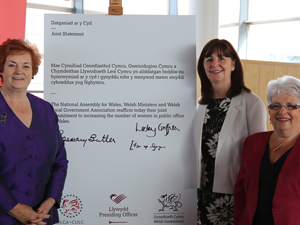Access
The privileging of descriptive representation as a key feminist goal has in recent years been questioned by some academics and activists. Yet parliaments remain an important site of representation and counting the numbers of women representatives remains a core empirical focus for international research. Women’s political presence can, moreover, be rolled back in the absence of political will and equality measures, or where informal party practices and parliamentary norms prove particularly ‘sticky’.
The 2015 UK general and the 2016 devolved elections constitute timely new cases for evaluating descriptive representation. Parity is unlikely given the absence of legislative or strong party quotas (e.g All Women Shortlists, ‘twinning’ or ‘zipping’). The efficacy of quotas, demonstrated by international evidence remains mostly resisted in elections to Westminster and in N. Ireland, whilst in Scotland and Wales the 1999 measures have not ‘caught on’ in subsequent elections. Nor have the 2010 Speaker’s Conference recommendations been fully implemented and women’s civil society mobilization has produced little perceptible difference on governing elites.
Voice
There is widespread academic acknowledgement that women are a heterogeneous group; that different women, even within the same society, will likely have different conceptions of what constitutes women’s issues and interests. Recent theoretical and empirical scholarship further recognises that multiple representative claims will be made ‘for women’, by both elected and non-elected representatives, who may or may not be feminist.
In analyzing women’s attitudes, this Seminar Series gives particular attention to intra-sex differences, reflecting debates over traditional, modern and gender-generation, the foci of contemporary feminism, and the apparent decline in working-class (and low levels of ethnic minority representation in parliamentary politics. The content and direction of claims made by parliamentary and extra-parliamentary actors will be examined.:
- How are women’s issues and interests, notions of gender and gender relations, and equality constituted by representatives?
- Do claims vary by actor, or site?
- Are there different claims in a context of weakening ties across the UK post-devolution, mirroring the greater distinctiveness and independence of politics in Scotland and Wales, and the contested political identities in N. Ireland?
See:
Accountability
Accountabilty is interrogated in two ways:
- Policy agendas, outcomes and effectiveness
- Representational theory
Regarding policy, what women’s issues have elected representatives prioritized and claimed to have delivered upon? How have government and other actors evaluated policy effectiveness? How have government policies impacted gender (in)equality across the UK? These are urgent questions.
The leading women’s rights organization – Fawcett – tried to take the Coalition to court in 2010; and the Women’s Budget Group accuses the UK Government’s cuts of disproportionately and negatively impacting women. The National Women’s Commission has been abolished, limiting UK-wide relations; the EHRC has experienced extensive staffing and budget cuts; and the 2010 Equality Act is threatened with legislative reform. Meanwhile, in Scotland, the marked gender gap (in men’s favour) in support of independence has resulted in growing attention to classic women’s issues and the perspectives of women’s groups (e.g. Women for Independence and Women Better Together).
By offering a gendered audit of politics and power in the UK this Series is, furthermore, well-placed to advance representational theory, speaking to feminist and traditional scholarship. Determining what constitutes the ‘good’ substantive representation of women requires consideration of the marketplace of gendered representative claims and acts, alongside the mapping of relationships between extra- and parliamentary representatives, and the women they claim to represent. This then permits examination of congruency and accountability (Severs 2012) between the claims and actions of elected and non-elected representatives, and those they claim to represent.
